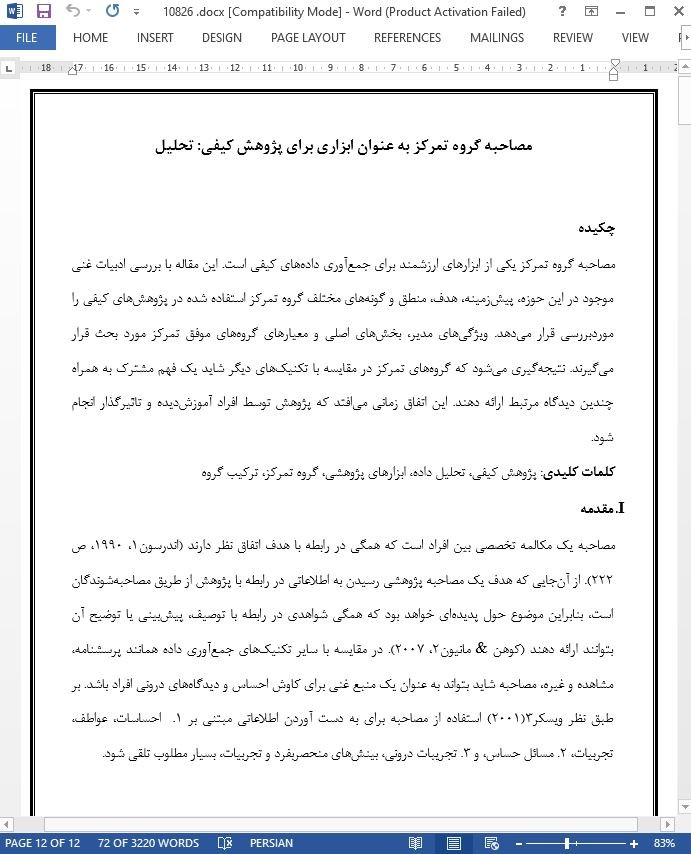
مصاحبه گروه تمرکز به عنوان ابزاری برای پژوهش کیفی
چکیده
مصاحبه گروه تمرکز یکی از ابزارهای ارزشمند برای جمعآوری دادههای کیفی است. این مقاله با بررسی ادبیات غنی موجود در این حوزه، پیشزمینه، هدف، منطق و گونههای مختلف گروه تمرکز استفاده شده در پژوهشهای کیفی را موردبررسی قرار میدهد. ویژگیهای مدیر، بخشهای اصلی و معیارهای گروههای موفق تمرکز مورد بحث قرار میگیرند. نتیجهگیری میشود که گروههای تمرکز در مقایسه با تکنیکهای دیگر شاید یک فهم مشترک به همراه چندین دیدگاه مرتبط ارائه دهند. این اتفاق زمانی میافتد که پژوهش توسط افراد آموزشدیده و تاثیرگذار انجام شود. کلمات کلیدی: پژوهش کیفی، تحلیل داده، ابزارهای پژوهشی، گروه تمرکز، ترکیب گروه
I. مقدمه
مصاحبه یک مکالمه تخصصی بین افراد است که همگی در رابطه با هدف اتفاق نظر دارند (اندرسون ، 1990، ص 222). از آنجایی که هدف یک مصاحبه پژوهشی رسیدن به اطلاعاتی در رابطه با پژوهش از طریق مصاحبهشوندگان است، بنابراین موضوع حول پدیدهای خواهد بود که همگی شواهدی در رابطه با توصیف، پیشبینی یا توضیح آن بتوانند ارائه دهند (کوهن & مانیون ، 2007). در مقایسه با سایر تکنیکهای جمعآوری داده همانند پرسشنامه، مشاهده و غیره، مصاحبه شاید بتواند به عنوان یک منبع غنی برای کاوش احساس و دیدگاههای درونی افراد باشد. بر طبق نظر ویسکر (2001) استفاده از مصاحبه برای به دست آوردن اطلاعاتی مبتنی بر 1. احساسات، عواطف، تجربیات، 2. مسائل حساس، و 3. تجریبات درونی، بینشهای منحصربفرد و تجربیات، بسیار مطلوب تلقی شود.
X. نتیجهگیری
گروه تمرکز چیزی بیشتر از گردآوری مصاحبههای فردی است. المان همکاری و تعامل بین افراد نقش اصلی را در ایجاد ایدهها ایفا مینماید. علیرغم محدودیت کم آنها، مصاحبههای گروههای تمرکز ابزارهایی ارزشمند برای گردآوری دادههای کیفی هستند. آنها برای پژوهشهای مربوط به برنامهریزی، بهبود و ارزیابی برنامههای خاص مفید هستند. وقتی که آنها توسط افراد آموزشدیده و ماهر مورد استفاده قرار گیرند، دادههای کیفی صحیح و مطمئنی حاصل خواهند شد.
Abstract
Focus group interview is one of the valuable tools for collecting qualitative data. In view of extensive literature on the subject, this paper examines the background, purpose, rationale, and various forms of focus groups to be used in qualitative research. Characteristics of moderator, major phases and criteria of successful focus groups have also been discussed. It is concluded that the focus groups, compared to other techniques, may yield shared understanding and several perspectives of a given topic if they are conducted by well-trained efficient researchers.
I. Introduction
Interview is “a specialized form of communication between people for a specific purpose associated with some agreed subject matter” (Anderson, 1990, p.222). As the purpose of the research interview is to obtain research-relevant information from the interviewee, it is centred on the evidence to be generated for achieving the research objectives of describing, predicting or explaining the phenomenon (Cohen & Manion, 2007). As compared to other techniques of data collection e.g. questionnaire, observation, etc., interview may serve as a rich source for exploring people’s inner feelings and attitudes. According to Wisker (2001), the use of interview is highly desirable for obtaining information based on i. emotions, feelings, experiences, ii. sensitive issues, and, iii. insider experience, privileged insights and experiences.
X. Conclusion
Focus groups are more than collection of individual interviews. The element of synergy and interaction between the group members play significant role in generating the data. Despite their few limitations, focus group interviews are valuable tools for collecting the qualitative data. They are much useful for the researches relating to planning, improvement and evaluation of certain programmes. When used by the trained and skilled researchers, they may yield efficiently valid and reliable qualitative data.

چکیده
I. مقدمه
II. مصاحبه گروه تمرکز به چه معناست؟
III. ویژگیهای مصاحبههای گروه تمرکز
IV. هدف و اصول بنیادین
V. استفاده از گروه تمرکز به عنوان یک روش
VI. ویژگیهای یک مدیر
VII. فازهای مختلف مصاحبه گروه تمرکز
1. برنامهریزی گروه تمرکز
2. ترکیب گروه
3. راه اندازی یک گروه تمرکز
4. ثبت پاسخها
5. تحلیل دادهها
6. گزارش یافتهها
VIII. معیارهای برای گروههای موفق تمرکز
IX. مزایا و محدودیتهای مصاحبههای گروه تمرکز
X. نتیجهگیری
Abstract
I. Introduction
II. What is Focus Group Interview?
III. Characteristics of Focus Group Interview
IV. The Purpose and Rationale
V. Use of Focus Group as A Method
VI. Characteristics of the Moderator
VII. Phases of Focus Group Interview
1. Planning the Focus Group
2. Group Composition
3. Conducting the Focus Group
4. Recording the Responses
5. Data Analysis
6. Reporting the Findings
VIII. Criteria for the Successful Focus Group
IX. Advantages and Limitations of Focus Group Interview
X. Conclusion
- ترجمه فارسی مقاله با فرمت ورد (word) با قابلیت ویرایش، بدون آرم سایت ای ترجمه
- ترجمه فارسی مقاله با فرمت pdf، بدون آرم سایت ای ترجمه
